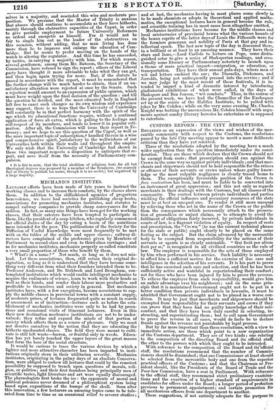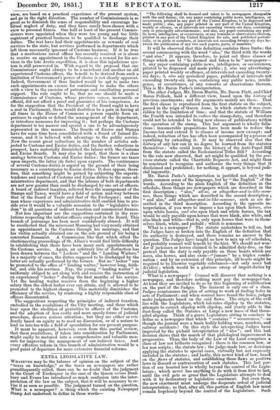CUSTOMS REFORM: THE CITY RESOLUTIONS. REGA_RDED as an expression of
the views and wishes of the mer- cantile community with respect to the Customs, the resolutions passed by the late City meeting appear to merit a more deliberate criticism than they have yet received. Three of the resolutions adopted by the meeting have a much wider application than the question immediately under its consi- deration. They are those which declare that the Crown should not be exempt from costs ; that prescription should run against the Crown in the same way as against private individuals ; and that mer- chants and shipowners should not be held responsible for the crimes or offences of their servants or crews unless where guilty know- ledge or the most culpable negligence is clearly traced home to them. The exceptionally favourable position of the Crown in foro contentioso has been, and must be liable to be converted into an instrument of great oppression ; and this not only as regards merchants in their dealings with the Customs but all classes of the community. The contest between private individuals and parties wielding the official influence and pecuniary resources of the state must be at best an unequal one. To render it still more unequal by relieving those who act in the name of the Crown or the public from the consequences which necessarily attach to the prosecu- tion of groundless or unjust claims, or to attempts to avoid the fulfilment of obligations fairly incurred, by private individuals in courts of law, is a flagrant violation of equity. In respect of costs and prescription, the " Crcwn " (to use the current technical phrase for the state or public) ought clearly to be placed on the same footing as the subject. But the claim advanced by the mercantile body to be exempted from responsibility for the actions of their servants or agents is as clearly untenable. " Qui fecit per alium fecit per se," is recognized in all civilized countries as the rule of law. The employer is responsible for the acts of those employed by him when performed in his service. Such liability is necessary to afford him a sufficient motive for the exercise of due care and intelligence in the selection of his servants. It is his part to prove that he has exercised such care and selection, and that he has been sufficiently active and watchful in superintending their conduct ; not for those who have been injured by him to prove the reverse. To relieve the employer from such responsibility, would give him an unfair advantage over his neighbours ; and on the same prin- ciple that it is maintained Government ought not to be put in a better condition than private individuals in lawsuits, it must be admitted that Government ought not to be placed in a worse con- dition. It may be just that merchants and shipowners should be exempted from responsibility for their servants and crews if they can prove that they have had no guilty knowledge of their mis- conduct, and that they have been duly careful in selecting, in- structing, and superintending them ; but to call upon Government to prove the reverse in all cases, would de facto be to declare frauds against the revenue not punishable by legal process.
But by far more important than these resolutions, with a view to immediate action, are those which point to a new organization of the Customs department. They are of two kinds; one relating to the composition of the directing Board and its official staff, the other to the powers with which they ought to be intrusted.
With reference to the composition of the Board and its—official staff, the resolutions recommend that the number of Commis- sioners should be diminished ; that one Commissioner at least should be selected from the mercantile body and one from the superior practical officers of the Customs ; and that the Chairman or Pre- sident should, like the Presidents of the Board of Trade and the Poor-law Commission, have a seat in Parliament. With referencii to the official staff, they recommend strict preliminary examina- tions and the exaction of a higher standard of acquirements in candidates for offices under the Board ; a longer period of probation previous to permanent appointment; and certain promotion for all meritorious officers from one department to another.
These suggestions, if not entirely adequate for the purposeill
view, are based on a practical experience of the present system, and go in the right direction. The number of Commissioners is so great as to diminish the sense of responsibility and encourage ha- bitual neglect of duty, and they have rarely been chosen with a view to personal fitness. One half at least of the present Commis- sioners were appointed when they were too young and too little cognizant of practical business to be qualified to discharge their duties. The rest have had their appointments as rewards of real services to the state, but services performed in departments which left them necessarily ignorant of Customs business. If it be true that a meritorious naval officer has recently received or is about to receive an appointment in the Customs as a reward for his ser- vices in the late Arctic expedition, it is clear this injudicious sys- tem is still persevered in. With regard to the proposal that one Commissioner ought always to be a merchant and another an old experienced Customs-officer, the benefit to be derived from such a limitation of Government's power of choice is not clearly apparent. Indeed, Government if thus limited would be apt to make two such appointments an excuse for continuing to make the others with a view to the exercise of patronage and conciliating personal support. The rule ought to be, that no one should be made a Commissioner of Customs, whose previous career, mercantile or official, did not afford a proof and guarantee of his competence. As for the suggestion that the President of the Board ought to have a seat in Parliament, there would doubtless be a gain in having at all times in the House of Commons a person capable from ex- perience to explain or defend the management of the department, or introduce measures for improving it ; but perhaps the Customs department is too narrow and special a one to be advantageously represented in this manner. The Boards of Excise and Stamps have for some time been consolidated with a Board of Inland Re- venue, and it is believed with advantage to the public service. Now the recent great reductions in the number of articles sub- jected to Customs and Excise duties, and the further reductions in prospect, have materially diminished the labour with the Customs and Excise Boards. It may also be urged, that there is a close analogy between Customs and Excise duties : the former are taxes upon imports, the latter (de facto) upon exports. The continuance of several Customs-duties is argued on the ground of their being necessary as a counterpoise to Excise duties. It does appear, there- fore, that something might be gained by subjecting the superin- tendence and control of Customs and Excise duties to the same ad- ministrative department, and that the labours of both departments are not now greater than could be discharged by one set of officers. A board of indirect taxation, relieved from the management of the Stamps and Taxes, would have a field of action mid-way between that of the Board of Trade and that of the Exchequer ; and the man whose experience and administrative skill enabled him to pre- side over it would be a valuable accession to the "legislative wis- dom" in all questions of indirect taxation and commercial finance.
Not less important are the suggestions contained in the reso- lutions respecting the inferior officers employed in the Board. This branch of patronage has been most scandalously abused. It will be recollected that the miscreant Manning had very nearly obtained an appointment in the Customs through his marriage, and that his victim actually obtained one on the sole ground of his being a converted Romanist. A Commission like that which sifted the electioneering proceedings of St. Alban's would find little difficulty in establishing that _there have been many such appointments in the Customs service. Again, an arbitrary line of distinction has been drawn between the "Lockers " and the "Landing Waiters." In a majority of cases, the duties supposed to be discharged by the latter are actually performed by the former. But no "locker " can be promoted to the office of "landing waiter," however long, faith- ful, and able his services. Nay, the young "landing waiter" is uniformly obliged to act along with and receive the instruction of an experienced " locker " during the first months of his service. Yet the landing waiter receives from the beginning a higher salary than the oldest locker ever can attain, and is allowed to be promoted to the highest charges. This materially diminishes the efficiency of the service, by rendering a highly responsible class of officers discontented.
The suggestions respecting the principles of indirect taxation, embodied in the resolutions of the City meeting, and those which bear upon the abolition of gratuities to officers of the Customs, and the adoption of less costly and. more speedy forms of judicial procedure, deserve serious attention ; but they are either so evi- dently based on equity as to need no discussion, or of a nature to lead us into too wide a field of speculation for our present purpose. It must be apparent, however, even from this partial review, that the4 resolutions, if taken into consideration by Parliament, might eafily be matured into a comprehensive and valuable mea- sure for improving the management of our indirect taxes. And every effective reform in this branch of administration would be a good point of departure for more extensive financial reforms.



































 Previous page
Previous page